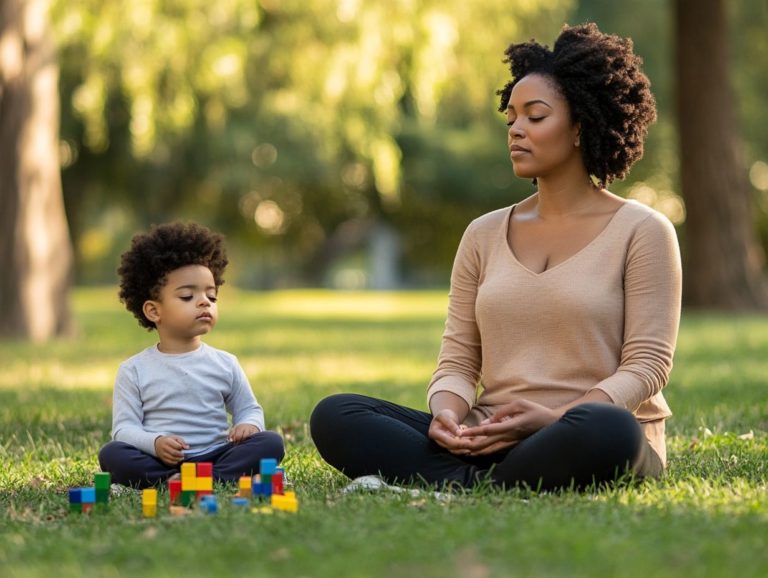5 Key Benefits of Mindfulness in Parenting
Contents
Benefits of Mindful Parenting
Parenting is a journey that can be both rewarding and challenging, often accompanied by its fair share of stress, uncertainty, and even reactiveness.
By embracing mindfulness, you have the opportunity to transform your approach, fostering deeper connections with your children while simultaneously enhancing your own emotional well-being and communication skills.
This exploration delves into five key benefits of mindful parenting, highlighting how it can help you manage stress, improve communication, promote empathy and understanding, and enhance positive parenting strategies.
Discover practical techniques to weave mindfulness into your daily routines! Learn how these practices can benefit both you and your children, paving the way for a more harmonious family life. These practices, including mindful listening and self-compassion, can significantly enhance your parenting behaviors and relationships.
Key Takeaways:

- Mindfulness can help parents effectively handle stress and anxiety, allowing them to be more present and attentive to their children, including those with Attention Deficit Disorder (ADD) or ADHD.
- By practicing mindfulness, parents can better understand and manage their emotions, leading to improved communication and a more positive parent-child relationship. This approach is often referred to as compassionate parenting.
- Incorporating mindfulness into daily parenting routines can promote empathy and understanding, leading to a more empathetic and harmonious family dynamic while addressing various parenting challenges.
1. Helps in Managing Stress and Anxiety
Mindful parenting is essential for managing stress and anxiety for both you and your children. It creates an environment that encourages managing emotions and self-care, making it easier to navigate the complexities of everyday parenting challenges.
By integrating mindfulness techniques into your daily routine, you can find calm and strength that profoundly impacts your emotional well-being and strengthens your parent-child relationship.
Practices like breathing exercises help ground you. They provide a moment of tranquility amid chaos. Mindful listening fosters open communication, allowing you to better understand your child s needs while also modeling effective emotional expression and improving your parenting style.
Building support networks through family, friends, or community groups offers invaluable resources for stress relief and encouragement. Mindfulness practices enhance emotional regulation and support better decision-making. This leads to more thoughtful responses to challenges, fostering a healthier family dynamic and improving your overall stress management. Experts like Rachael Green and Yolanda Renteria have emphasized the importance of these support systems.
2. Increases Emotional Awareness and Regulation
Increasing your emotional awareness and regulation is vital for effective mindful parenting. It enables you to recognize both your own emotions and those of your children, leading to healthier interactions and improved parenting behaviors.
By honing your emotional awareness, you can cultivate self-regulation skills and adapt your parenting style to better address your children’s needs, ultimately enriching your parent-child relationship and fostering compassionate parenting.
This journey not only enhances the emotional toolkit you possess but also sets a powerful example for your children, teaching them how to navigate their own emotions.
Engaging in mindful techniques, such as deep breathing and reflective listening, allows you to create a supportive environment where emotions are acknowledged rather than suppressed. This is crucial for the child’s emotional development and well-being.
As you grow in your ability to manage your feelings, you ll find that the likelihood of employing positive parenting strategies increases. This fosters a climate of empathy, understanding, and resilience in your children. This approach often leads to better conflict resolution and stronger social skills.
These practices significantly bolster emotional intelligence and profoundly influence child development, paving the way for healthier social interactions and effective coping mechanisms as they mature. This is supported by research from sources such as Verywell Mind.
Start your mindful parenting journey today for a happier family life!
3. Improves Parent-Child Communication
Let s dive into how improving parent-child communication can transform your family life! Improving parent-child communication is essential for mindful parenting. By honing your communication skills, you build a robust parent-child relationship and navigate conflicts with grace. When you use listening carefully, you create a safe haven for your children, fostering open dialogue and mutual understanding as you tackle various social situations together. This helps reduce reactiveness and promotes a more harmonious family environment.
This practice helps you really hear what your children are saying, validating their feelings and experiences in a profound way. Engaging in active listening maintaining eye contact, using reflective statements, and nodding in acknowledgment can enhance your interactions and make your children feel truly seen.
By expressing compassion through gentle tones and empathy, you help your children feel valued and understood. Over time, these strategies strengthen the bonds within your family and nurture emotional intelligence in your children, equipping them with vital skills for their future relationships.
As you consistently practice these communication methods, you may notice improvements in emotional well-being and resilience, leading to a more harmonious home environment.
4. Promotes Empathy and Understanding

Promoting empathy and understanding through mindful parenting is crucial for developing strong emotional connections with your child. This creates a nurturing and compassionate environment. By cultivating emotional awareness, you gain deeper insights into your child’s feelings and experiences, leading to more supportive parenting behaviors and healthier relationships. This can be particularly beneficial for children with Attention Deficit Disorder (ADD), a condition that affects focus and behavior, or ADHD.
This empathetic approach strengthens your bond and enhances your child’s emotional intelligence, allowing them to navigate their feelings with greater ease. For instance, when you listen to your child’s frustrations about a challenging day at school and validate those emotions, you teach them that their feelings truly matter. This validation aids in conflict resolution and social interactions.
Such interactions boost your child’s self-esteem and equip them with the ability to empathize with their peers, fostering a strong sense of community and belonging. Over time, these lessons in compassion yield profound long-term benefits, including improved social skills and resilience in facing challenges. Experts like Bruno Bettelheim support this approach.
5. Encourages Mindful Parenting Practices
Encouraging mindful activities is vital for cultivating a nurturing environment that fosters growth for both you and your child. These strategies integrate mindfulness into your everyday interactions and decision-making processes. By embracing mindfulness techniques, you refine your parenting style, nurturing self-compassion and patience, leading to healthier family dynamics. Parenting experts such as Jon Kabat-Zinn emphasize these methods.
Mindful activities can be beautifully diverse, tailored to suit various parenting philosophies, whether you lean towards authoritative, permissive, or a harmonious blend of different styles. If you tend to be more structured, consider setting aside dedicated time for mindful breathing exercises as a family, allowing everyone to ground themselves after a whirlwind of a day. This diversity in practice can address various parenting challenges and enhance overall family well-being.
You can explore the power of listening carefully truly engaging with your child’s feelings and thoughts. This demonstrates empathy and support in a way that strengthens your bond. Self-compassion is equally crucial, as it enables you to forgive yourself in challenging moments and recognize that imperfection is part of the parenting journey. These mindful techniques aid in self-regulation and improve overall parenting behaviors.
By acknowledging your struggles, you foster a more forgiving atmosphere that ultimately benefits both you and your children. This self-awareness is crucial for emotional regulation and well-being.
What Is Mindfulness and How Can It Be Applied to Parenting?
Mindfulness, as described by experts like Jon Kabat-Zinn and Rachael Green, invites you to cultivate a moment-to-moment awareness of your thoughts, emotions, and surroundings. When you apply this practice to parenting, you unlock a profound enhancement in emotional regulation and overall well-being for both you and your children.
Engaging fully in your interactions fosters deeper connections. It also nurtures healthier relationships, equipping you with the skills to navigate parenting challenges.
This approach is supported by resources like Verywell Mind.
By incorporating mindfulness into your parenting, you approach each situation with clarity and composure. This significantly diminishes the chances of reacting impulsively to stressors. Parenting experts like Rachael Green and Yolanda Renteria note that these practices can dramatically enhance communication. You learn to listen attentively and respond thoughtfully rather than from a place of frustration.
This heightened awareness enables you to manage your own emotions more adeptly while setting a powerful example for your children. You illustrate the importance of self-regulation, which is crucial for effective parenting strategies and fostering a supportive family environment.
As you and your family embrace a more mindful approach, the potential for transformation becomes clear. You create a nurturing environment where emotions are not only understood but also expressed in a healthy manner. This practice significantly impacts child development and enriches overall family relationships.
How Can Mindfulness Help with Parenting Challenges?
Mindfulness can become an invaluable ally in navigating the complexities of parenting. It provides you with self-regulation skills and enhances your emotional awareness. This allows you to respond thoughtfully rather than react impulsively.
By embracing mindfulness, you can more effectively manage stress and anxiety, ultimately leading to improved decision-making in challenging situations. This approach is supported by parenting experts like Jon Kabat-Zinn and Bruno Bettelheim. Additionally, learning how mindfulness can help parenting can further enhance your skills as a parent.
Consider a scenario where your child is throwing a tantrum. Instead of allowing frustration to dictate your response, take a moment to breathe deeply and ground yourself. This creates a calmer environment. Not only does this model emotional regulation for your child, but it also helps diffuse the intensity of the moment.
In social situations where your child may struggle to engage, employ mindful listening techniques. Encourage them to articulate their feelings while you demonstrate empathy. Such practices do more than just alleviate immediate stress; they foster strong emotional connections and communication skills that enrich your relationship with your child and your parenting journey.
What Are Some Mindful Parenting Techniques to Try?

There are several mindful parenting techniques you can explore to elevate your parenting strategies and enhance emotional regulation. Techniques such as deep breathing exercises, mindful listening, and setting daily intentions are not just trendy buzzwords; they can truly transform your home into a peaceful and understanding haven.
Incorporating deep breathing exercises into your daily routine can help you cultivate a sense of calm. This enables you to respond more thoughtfully to your children’s needs. Mindful listening invites you to engage actively during conversations, fostering empathy and connection.
Setting daily intentions provides a framework that guides your family’s interactions with purpose and clarity. These strategies work wonders for managing stress and reinforcing emotional resilience. Together, they create a nurturing atmosphere where everyone in the family feels valued and heard.
With consistent practice, these techniques can significantly improve communication and strengthen bonds among family members, enhancing overall wellbeing.
How Can Mindfulness Benefit Both Parents and Children?
Mindfulness provides a wealth of benefits for both you and your children, enhancing emotional awareness and fortifying the parent-child bond. This nurturing practice leads to healthier family interactions and robust support networks. When you engage in mindfulness together, you create an atmosphere rich in understanding and compassion elements that are essential for emotional well-being.
Participating in activities such as mindful breathing, meditation, or reflective conversations allows you to establish a safe and valued space for your family members. This shared practice not only cultivates emotional intelligence but also fosters open communication. As a parent, you can model effective coping strategies while your children develop their own emotional tools.
These shared experiences deepen your connections, enabling both you and your children to navigate life’s challenges with resilience and clarity. Ultimately, embracing mindful parenting can transform your daily interactions, enriching the emotional landscape of your family and promoting a harmonious environment where everyone thrives together.
What Are the Common Misconceptions About Mindful Parenting?
There are several misconceptions surrounding mindful parenting that may lead you to believe it demands perfection or revolves solely around meditation. These misunderstandings can often hold you back from embracing this transformative approach. In truth, mindful parenting is more about managing emotions better, awareness, and the practical application of mindfulness across different parenting styles.
Recognizing that mindful parenting doesn’t equate to flawless parenting can significantly alleviate the pressure you might feel. It encourages you to be present and engaged with your children, creating an environment where emotional expression is genuinely valued. Exploring how mindfulness can transform parenting can enhance this approach even further.
By incorporating techniques like active listening and moment-to-moment awareness, you can cultivate a serene atmosphere within your home. The emphasis shifts away from striving for an ideal parent-child dynamic, focusing instead on nurturing a deeper connection, acknowledging emotions, and responding thoughtfully rather than reactively.
This journey of mindful parenting allows your family to thrive together, embracing imperfections while strengthening relationships. For more insight, explore the long-term benefits of mindful parenting.
How Can Mindfulness Be Incorporated into Daily Parenting Routines?
Incorporating mindfulness into your daily parenting routines can be achieved through simple yet powerful practices that enhance your parenting behaviors and create a more serene environment for your family. Techniques such as mindful breathing during transitions, gratitude journaling, and intentional pauses in communication can significantly transform your family dynamic.
For example, when you encounter challenging moments, taking a moment to breathe together can help both you and your child reset emotions, paving the way for more thoughtful responses. Encouraging your children to express what they re grateful for at dinner can foster a positive atmosphere and strengthen your family bonds.
Building a support network of friends, family, or parenting groups can provide the motivation and accountability you need to ensure these mindfulness techniques are practiced consistently. This collaborative approach not only emphasizes the importance of how to cultivate mindfulness in parenting but also enriches the shared family experience, making it more enjoyable and fulfilling for everyone involved.
Frequently Asked Questions

What are the 5 key benefits of mindfulness in parenting?
The 5 key benefits of mindfulness in parenting are increased emotional regulation, improved communication, enhanced self-awareness, strengthened parent-child bond, and reduced stress and anxiety.
How does mindfulness help with emotional regulation in parenting?
Mindfulness allows parents to become aware of their emotions and respond to them in a calm and controlled manner, rather than reacting impulsively. This can lead to more positive and effective communication with their children.
Start incorporating mindfulness into your daily routine today for immediate benefits!
Using Mindfulness in Parenting
Mindfulness can transform the way parents interact with their children. Here are some ways it can help.
Can mindfulness improve communication with children?
Yes, being present and attentive allows parents to understand their child’s needs better. This leads to improved communication and connection.
How does mindfulness enhance self-awareness in parenting?
How well do you know your own feelings as a parent? Mindfulness means being aware of your thoughts, feelings, and sensations right now! This can help parents recognize and manage their own triggers and patterns, leading to more intentional and mindful parenting.
How does mindfulness strengthen the bond between parents and children?
By being fully present and engaged with their children, parents can build a stronger and more meaningful connection. Mindfulness helps parents respond to their children’s needs with empathy and understanding, fostering a deeper bond.
Can mindfulness reduce stress and anxiety in parenting?
Yes, by helping parents to be more present and less reactive, mindfulness can reduce stress and anxiety in parenting. It also encourages parents to take breaks for self-care, which can lead to a more balanced and peaceful approach to parenting.
Start Practicing Mindfulness Today!
Embrace mindfulness in your parenting journey. It can lead to a happier, more connected family!






